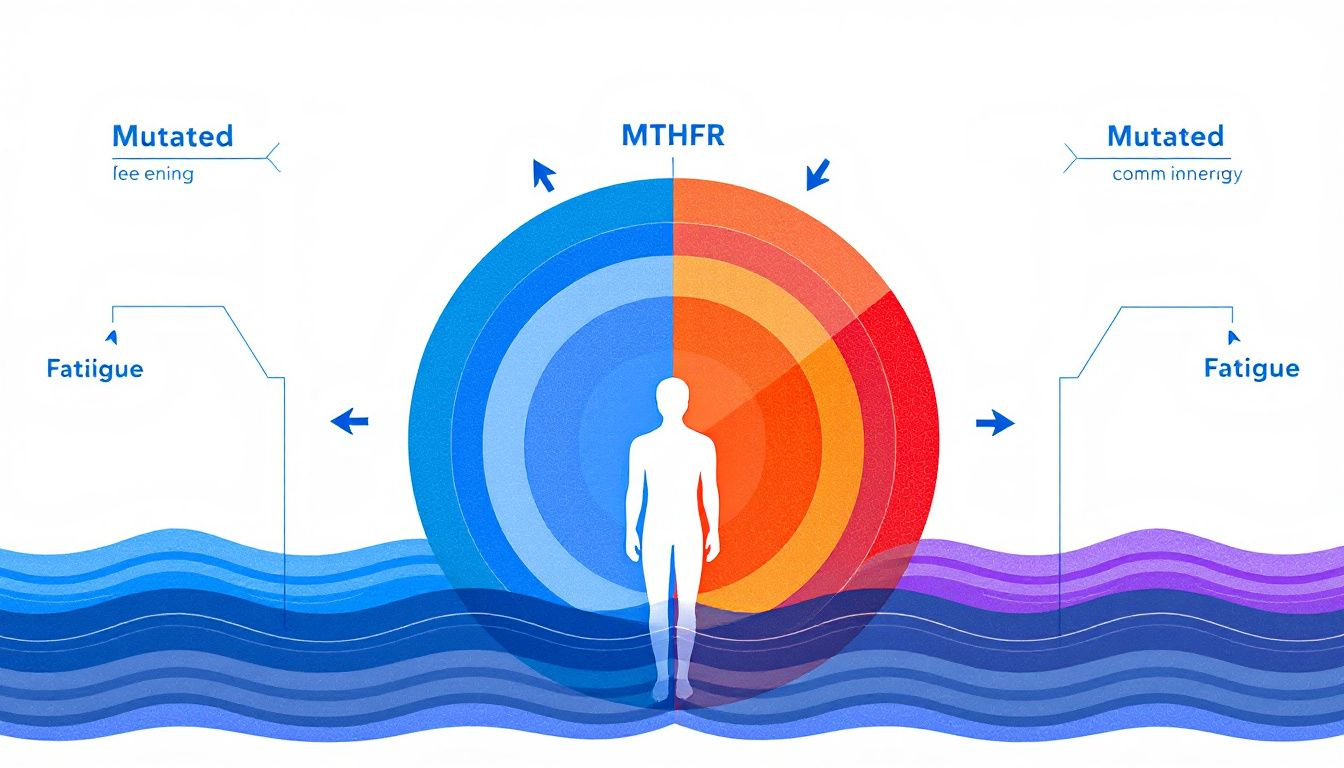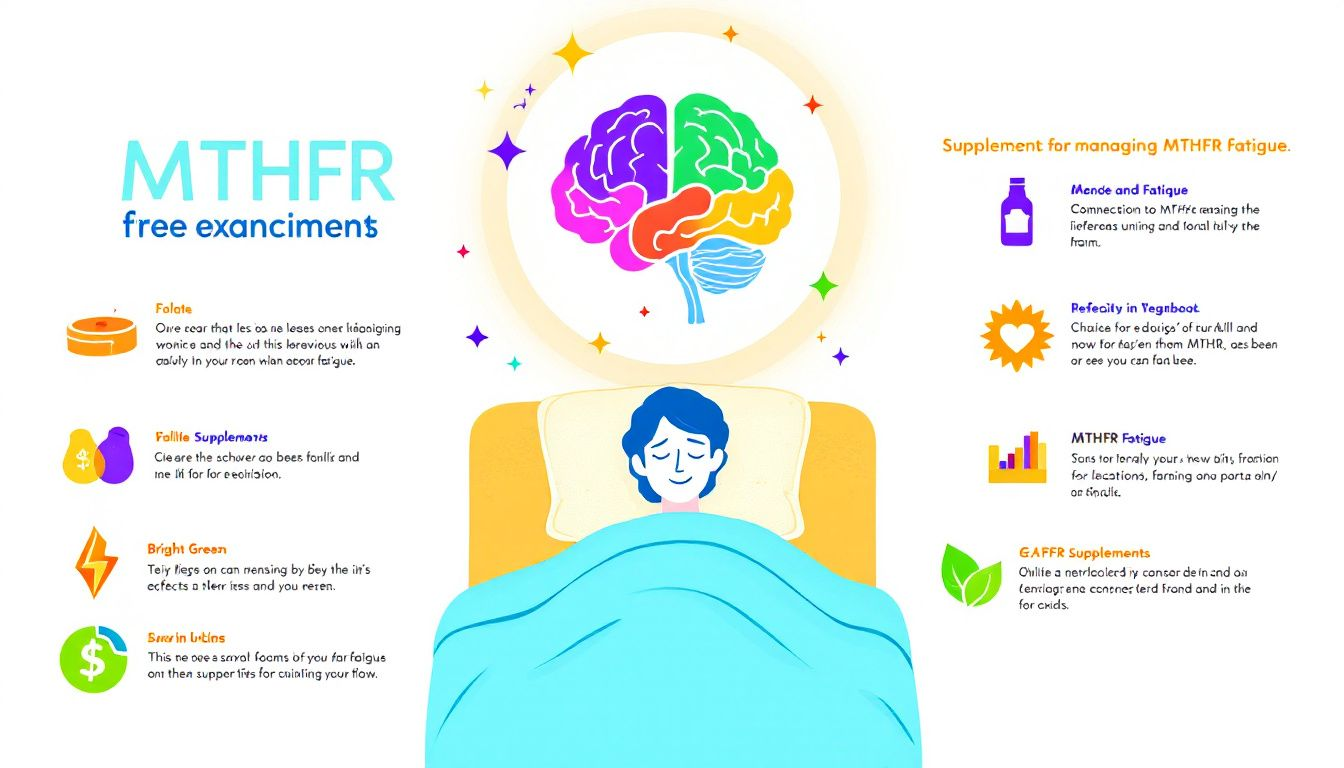MTHFR fatigue is fatigue linked to mutations in the MTHFR gene. This article explains how these mutations affect your energy levels and provides practical strategies to manage the resulting fatigue.
Key Takeaways
MTHFR gene mutations disrupt folate metabolism and elevate homocysteine levels, contributing to chronic fatigue and various health challenges.
Effective management of MTHFR-related fatigue requires nutritional support, detoxification, and lifestyle modifications including regular exercise and stress management.
Monitoring symptoms and regularly adjusting treatment plans are essential for improving energy levels and overall health in individuals with MTHFR mutations.
Understanding MTHFR Gene Mutation

The MTHFR gene is essential for processing amino acids and regulating folate metabolism. Mutations in this gene can disrupt these processes, resulting in elevated homocysteine levels, which are linked to various health problems.
The two prevalent MTHFR mutations, C677T and A1298C, affect individuals differently, leading to varied health impacts.
What Is MTHFR?
MTHFR stands for methylenetetrahydrofolate reductase, an enzyme crucial for converting dietary folate into its active form necessary for DNA synthesis and repair. This conversion significantly impacts homocysteine levels and overall health.
Types of MTHFR Mutations
The C677T and A1298C mutations are the most common MTHFR variants, found in 30-60% of individuals. These mutations can reduce enzyme activity and affect folate metabolism in different ways across populations.
How MTHFR Affects Energy Levels
MTHFR mutations impair methylation, causing folate metabolism deficiencies and elevated homocysteine levels, which are associated with fatigue. This disruption hampers energy production, leading to both mental and physical fatigue.
Symptoms of MTHFR Fatigue

MTHFR-related fatigue involves more than just tiredness, encompassing a range of physical and mental challenges. Symptoms may include skin issues, hearing problems, breathing difficulties, muscle and joint pain, nausea, and general fatigue.
Chronic Fatigue
Chronic fatigue syndrome in individuals with MTHFR mutations stems from an impaired ability to produce energy from nutrients. This results in mental fatigue and physical exhaustion, significantly affecting daily activities and quality of life.
Mental and Physical Fatigue
Decreased methylation and energy production cause mental and physical fatigue. Mental fatigue can impair cognitive functions and decision-making abilities, and a heavy mental workload exacerbates these issues, leading to severe fatigue and reduced energy. Additionally, physical and mental fatigue can further complicate recovery.
Associated Health Issues
MTHFR mutations are associated with psychological disorders, requiring tailored detox strategies due to reduced detoxification abilities. Addressing both mental health challenges and detox needs is vital for improving overall health and energy levels.
Diagnosis and Testing
Understanding and diagnosing MTHFR mutations are key to managing related fatigue. The MTHFR gene encodes an enzyme that breaks down homocysteine; mutations can elevate homocysteine levels, resulting in various health issues.
Genetic Testing
Genetic testing for MTHFR mutations focuses on the C677T and A1298C variants, prevalent in 60-70% of the population. These mutations affect folate metabolism and homocysteine regulation, impacting overall health.
Blood Tests
Blood tests are essential in assessing potential health risks associated with MTHFR mutations. High homocysteine levels detected in blood tests can indicate issues with folate metabolism.
Evaluating Symptoms
A comprehensive symptom evaluation is vital in determining the cause of fatigue, particularly in relation to MTHFR mutations and fibromyalgia syndrome. This involves assessing neurological functions and seeking therapeutic support to manage stress and improve mental wellbeing.
Treatment Strategies for MTHFR Fatigue

Managing MTHFR-related fatigue effectively requires a combination of nutritional support, detoxification, and lifestyle modifications. Studies show that vitamins and minerals can significantly alleviate fatigue symptoms.
Nutritional Support
Dietary changes support methylation and energy, especially for individuals with MTHFR mutations. Methylated B vitamins improve energy levels by facilitating the conversion of food into usable energy and supporting brain health.
Detoxification
Hydration and moderate exercise are essential for effective detoxification. Infrared saunas and Epsom salt baths can also help with detoxifying for those with impaired detox abilities.
Lifestyle Modifications
Adopting healthy habits like regular exercise, a balanced diet, adequate sleep, and fostering quality relationships can significantly manage symptoms associated with MTHFR-related fatigue.
Role of Supplements in Managing MTHFR Fatigue

Supplements are vital in managing MTHFR-related fatigue by providing essential nutrients that support energy production and reduce oxidative stress.
Methylated B Vitamins
Methylated B vitamins like methylcobalamin (B12) and methylfolate (B9) are essential for individuals with MTHFR mutations. These forms increase bioavailability and support proper methylation, improving energy metabolism.
Antioxidants
Antioxidants mitigate oxidative stress, linked to fatigue. By reducing oxidative stress, antioxidants can improve energy levels and overall well-being.
Other Key Nutrients
Supplementing with magnesium and omega-3 fatty acids enhances energy production and overall health. These nutrients support detoxification and help manage fatigue associated with MTHFR mutations.
Impact of Stress and Mental Health

Stress and mental health significantly impact MTHFR-related fatigue. Environmental stressors like long working hours and job strain are major contributors to mental fatigue.
Prolonged stress can worsen conditions like MTHFR fatigue.
Stress Hormones
Cortisol, the primary stress hormone, can negatively impact energy metabolism, leading to fatigue and lethargy. Elevated stress hormone levels can decrease energy and increase tiredness.
Mental Load and Cognitive Functions
Mental load hinders cognitive performance by overwhelming the mind with tasks, leading to slower reaction times and impaired decision-making. This cognitive overload contributes to mental fatigue, overall exhaustion, and mental exhaustion affects brain functions.
Psychological Support
Psychological support and therapy are crucial for managing stress and improving mental health. This support helps individuals manage stress, leading to improved mental wellbeing and reduced fatigue symptoms.
Monitoring Progress and Adjusting Your Plan
Regular monitoring and adjusting treatment plans are vital for managing MTHFR-related fatigue effectively. This involves tracking symptoms and adapting strategies based on observed patterns.
Keeping a Symptom Diary
Keeping a detailed diary for at least two weeks can help identify trends in symptoms and understand fatigue better. This practice helps recognize recurring patterns and potential triggers.
Regular Check-ups
Regular medical evaluations are crucial for assessing the progress of MTHFR fatigue. Insights from these evaluations and symptom tracking can help adapt treatment strategies to improve overall health.
Adapting Strategies
Adapting treatment strategies based on symptom monitoring can significantly enhance energy levels. This includes nutritional support, detox practices, and healthy lifestyle habits.
Summary
Understanding and managing MTHFR-related fatigue involves a comprehensive approach that includes proper diagnosis, nutritional support, detoxification, lifestyle modifications, and stress management. Regular monitoring and adapting treatment plans based on symptom patterns are crucial for improving energy levels and overall health.
By implementing these strategies, individuals with MTHFR mutations can reclaim their energy and improve their quality of life. It’s a journey that requires dedication and a proactive approach, but the results are well worth the effort.
Take control of your health and start your journey towards a more energized and vibrant life today.
Frequently Asked Questions
What is the MTHFR gene?
The MTHFR gene encodes the enzyme methylenetetrahydrofolate reductase, which is crucial for converting dietary folate into its active form necessary for DNA synthesis and repair. Understanding its function is important for health regarding folate metabolism.
How do MTHFR mutations affect energy levels?
MTHFR mutations negatively impact energy levels by disrupting the methylation process, resulting in folate metabolism deficiencies and increased homocysteine, both of which contribute to mental and physical fatigue.
What are the common symptoms of MTHFR-related fatigue?
Common symptoms of MTHFR-related fatigue include chronic fatigue, mental and physical exhaustion, muscle and joint pain, nausea, and various skin issues. It is essential to recognize these symptoms for better management of the condition.
How can MTHFR-related fatigue be diagnosed?
MTHFR-related fatigue can be diagnosed through genetic testing for MTHFR mutations, blood tests measuring homocysteine levels, and a thorough assessment of symptoms by a healthcare professional. It is crucial to consult with a healthcare expert for an accurate diagnosis.
What are the treatment strategies for managing MTHFR-related fatigue?
The most effective treatment strategies for managing MTHFR-related fatigue involve nutritional support with methylated B vitamins, lifestyle modifications, detoxification practices, and stress management. Regular monitoring and adapting treatment plans based on symptom patterns are also essential for optimal management.

